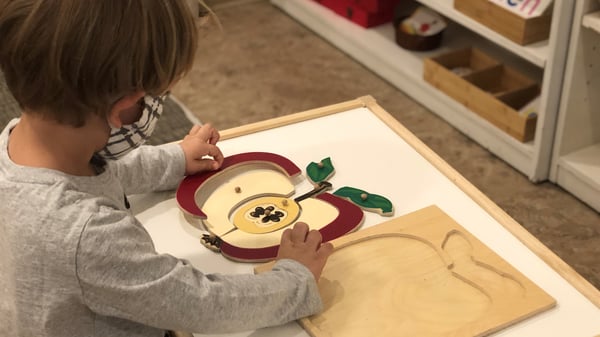 This year in the Montessori studio we will be holding observations by Zoom, which might be a first for a Montessori observation! While a virtual observation might not allow parents to see the entire studio, it does give parents an opportunity to be the proverbial fly on the wall and see a normal day in the life of your child. It will also give you a more uninterrupted, close-up view of your child than you might be able to have otherwise.
This year in the Montessori studio we will be holding observations by Zoom, which might be a first for a Montessori observation! While a virtual observation might not allow parents to see the entire studio, it does give parents an opportunity to be the proverbial fly on the wall and see a normal day in the life of your child. It will also give you a more uninterrupted, close-up view of your child than you might be able to have otherwise.
The Montessori method is founded on observation. As guides, we regularly step back to observe children working. We call it an observation and not an evaluation because we are seeking to learn and gain insight about the child through her behavior. We are looking at the type of work a child is inclined towards, how a child is processing information and interacting with the environment, and how a particular child learns.
We encourage you to take time to learn more about your child, celebrate the mini-achievements as well as the big ones, and to notice where she currently is on her developmental journey. What things are hard? What are easy and already mastered? What is a child in the process of learning? Children’s development is holistic and encompasses numerous dimensions, including the physical development of fine motor skills as well as body coordination and awareness. It includes cognitive skills, such as concentrating, memorizing, sequencing, and categorizing; and the development of executive functioning in order to choose an activity and manage time and materials to complete it. Language skills are also critical in this time period and include acquisition of oral language and expansion of vocabulary, and, later, the ability to reproduce language and concepts through writing.
In the studio, we encourage a child to work independently and develop the skills to manage his own space and complete a task. Guides are always present for support or to introduce new material as the child is ready. We also encourage the children to ask one another for help if they need it so that they learn they are capable of both giving and receiving peer support.
Maria Montessori noted which activities brought children into concentration and deepened their coordination. She also watched the process of learning and how children experience their own “aha!” moments that change their understanding of the world or themselves. Children are works in progress (aren’t we all!) and every child has his own developmental path. Observation offers a space to watch with curiosity to gain a deeper understanding of a child’s unique developmental unfolding.